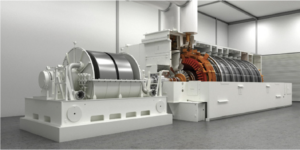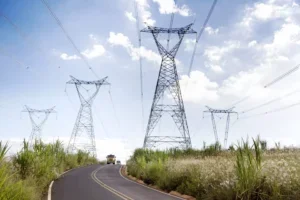Latest
-
Commentary
AI Is Draining the Grid—and the Power Solution Is Sitting Idle Right Next Door
Data centers are already among the world’s hungriest power users, and artificial intelligence (AI) is pushing their energy consumption to new heights. The International Energy Agency expects data centers’ electricity use to more than double by 2030, reaching roughly 1,000 TWh. That’s a growth rate four times faster than the overall grid. In some scenarios, AI-optimized facilities could […]
-
Nuclear
X-energy, Doosan Lock In 16-Unit Xe-100 Component Reservation as Doosan Commits to New SMR Factory
Small modular reactor (SMR) developer X-energy has secured a binding reservation agreement with South Korean power-generation equipment giant Doosan Enerbility to manufacture main power system steel components for 16 Xe-100 SMRs. As part of the decisive move to industrialize the supply chain for advanced nuclear energy, Doosan has also committed to building a new dedicated SMR […]
-
Nuclear
Trump Media Group, Fusion Company TAE Merging in $6-Billion Deal
The Trump Media & Technology Group (TMTG) is merging with a California-based company focused on development of nuclear fusion in a $6-billion deal. The all-stock transaction announced December 18 would create one of the first publicly traded fusion companies.
-
Energy Storage
Companies Announce Major Energy Storage Projects in Texas
A Colorado-based company focused on utility-scale battery energy storage has partnered with global technology group Wärtsilä and others for construction of a 500-MWh project near the Dallas-Fort Worth area in Texas, the latest of several major battery energy storage installations being built in the state.
-
Trends
Advanced Nuclear Developers Raise New Capital as 2025 Investment Hits Record Levels and Demonstrations Near
Three advanced nuclear developers—Radiant, Last Energy, and ARC Clean Technology—announced the closing of major private funding rounds in mid-December 2025, signaling renewed investor momentum behind microreactors and small modular reactors (SMRs) as the companies move from design and licensing into pilot deployment and early commercialization. The announcements—which span a new $300-million-plus round at Radiant, an […]
-
Coal
DOE Orders Last Coal-Fired Unit in Washington State to Remain Online
The last coal-fired power generation unit in Washington state, scheduled to close by year-end, is the latest U.S. coal facility ordered to remain in operation by the Trump administration. The U.S. Dept. of Energy (DOE) on December 16 told TransAlta, a Calgary, Canada-based independent power producer (IPP), to keep the 730-MW, coal-fired Centralia Unit 2 […]
-
Partner Content
Strengthening the Grid in a High-Renewables Future
Sponsored by:Siemens EnergyAs traditional thermal plants retire and renewable generation accelerates, system operators face a new challenge: how to maintain grid stability with less natural inertia. This featured POWER Magazine article explores the technical realities behind this shift—and the innovative solutions emerging to meet it. What You’ll Learn Inside this expert analysis, you’ll gain a clear understanding […]
-
Commentary
The Long Arc of Efficiency: What Refrigerators Teach Us About the Future of AI Data Centers
As AI demand accelerates, the race is on to bend the power curve before it bends the grid. The first electric refrigerators were mechanical curiosities—loud, bulky appliances that consumed staggering amounts of electricity. But they spread anyway, because the productivity gains were too great to ignore. Daily habits shifted. Food systems reshaped. Household labor changed […]
-
Press Releases
Hitachi Energy Investing $30 Million to Expand Canadian Operations
Hitachi Energy has announced investments of $30 million CAD ($22 million) to expand and modernize its service operations in Ontario, Canada. The investment aims at addressing Canada’s growing electricity demand while mitigating the challenges posed by aging grid infrastructure. It includes the purchase and upgrade of the company’s Stoney Creek facility and the acquisition of […]
-
Commentary
Powering the AI Revolution: Why the Energy Race Is the AI Race
The power of U.S. innovation and market incentives cannot be underestimated. The convergence of a business-driven energy transition and the explosive growth of artificial intelligence (AI) have exposed a critical bottleneck within our energy grid.










